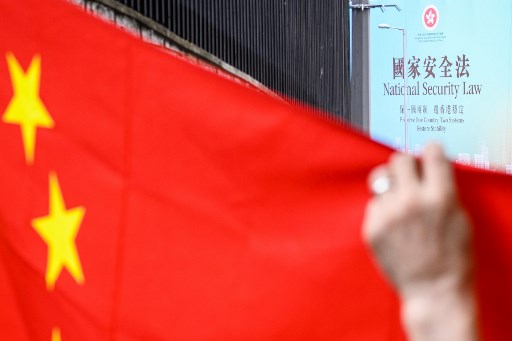
WASHINGTON, United States (AFP) — The US Senate on Thursday unanimously approved a bill that would lay out sanctions on Chinese officials who undermine Hong Kong’s autonomy as Beijing pushes forward with a controversial security law.
The House of Representatives still needs to pass the bill, which would allow sanctions in the United States against Chinese officials and the Hong Kong police as well as banks that conduct “significant transactions” with them.
The vote comes as China presses forward with a security law that would enforce punishment over subversion and other perceived threats in Hong Kong, which saw massive protests last year in support of maintaining the financial hub’s freedoms.
“They are moving forward in their process to take away the liberties of the people of Hong Kong. So time is of the essence,” said Senator Chris Van Hollen, a Democrat who helped lead the charge on the bipartisan bill.
“Passing a Senate resolution as the consequence to their action is hardly going to be taken seriously in Beijing,” he said on the Senate floor.
“And that’s why it’s important to actually do something that shows that the government of China will pay a price if it continues down this path to extinguish those freedoms of the people in Hong Kong.”
President Donald Trump’s administration has already declared that it no longer considers Hong Kong autonomous under US law, at a time when it has a host of troublesome issues with Beijing.
But the US government has so far outlined comparatively symbolic measures as repercussions and has not questioned the overall trading relationship with the city.
Van Hollen said it was not enough.
– ‘Greatest fear’ –
For Republican Senator Pat Toomey, who co-sponsored the bill, Beijing’s “greatest fear is that the people on the mainland will observe the freedoms in Hong Kong and decide maybe they’d like some of those freedoms too.”
“And that is a risk that the Chinese Communist leadership cannot tolerate,” he added.
The sanctions bill is expected to easily pass in the Democratic-led House of Representatives, which has repeatedly taken China to task on rights issues, and sent to Trump for his signature.
China promised to preserve a separate system for Hong Kong before taking back the territory from Britain in 1997.
But the government in Beijing says the national security law is needed to end the political unrest in Hong Kong and restore stability.
China will set up a “national security agency” in Hong Kong to oversee the law, which would override any existing legislation on the books in the territory, state news agency Xinhua said last week in a report detailing the draft.
The agency mentioned the creation of a separate security “council” chaired by Hong Kong’s chief executive, with the power to name judges to handle security cases.
The fast-tracking of the bill — which is bypassing Hong Kong’s legislature — has raised international concern that it will end the financial hub’s limited freedoms and usher in a new era of Communist-style repression.
© Agence France-Presse








